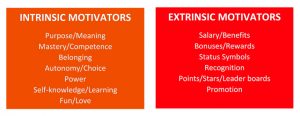Motivation in the virtual world
By George Kunnath
Has the COVID-19 crisis affected your motivation and the motivation of your team? The motivation of remote workers is a growing concern for managers. One of the devastating impacts of the virus has been on the stability of work, there was the furlough scheme, a massive increase in part-time or home-based work, and the even growing risk of redundancies. Many companies have also asked their staff to take a salary reduction to manage the cash flow and keep businesses afloat. This is having an adverse impact on our mental wellbeing, resilience and motivation.
When considering motivation we need to realise that there are two types – intrinsic and extrinsic. The extrinsic motivators are those motivators that are a result of the environment, such as your salary, awards, bonuses, the office you occupy, the parking space etc. If you are extrinsically motivated, this will be a difficult time.

Intrinsic and Extrinsic Motivators
Salary has never been a long term motivator, it’s a good motivator to get people to accept a new position but soon losses its power as the reality of the day-to-day sets in. However, it remains a major hygiene factor, so if people aren’t earning enough its quickly becomes a demotivator that you’ll know about. As the crisis persists, we are going to see more people demotivated due to reduced hours and lower earnings.
The move to remote working does not remove all extrinsic motivators, we can still show appreciation and recognise achievements even if it is done over Zoom or Microsoft Teams. Even the smallest acts of praise and recognised will be appreciated..
To keep people motivated leaders will have to focus more on the intrinsic motivators. These are the motivators that are fun and give us a sense of fulfilment. The key intrinsic motivators identified by Dan Pink are Autonomy, Mastery and Purpose.
Autonomy
Autonomy is the desire to be self-directed. One of the great motivators of remote working has been the greater amount of autonomy and flexibility. Allowing people to work on the tasks that interest them and the order in which they would like to tackle their work is a great motivator. Remote working makes it hard to micromanage, thus managers have to depend on trust and influence. While some organisations have moved to AGILE ways of working with morning and afternoon scrums, greater flexibility is given to individuals to figure out how the complete their tasks. This sense of freedom has seen productivity increase in a lot of organisations.
Mastery
Mastery is the motivation that comes with increased personal achievement though something like gaining a new skill or overcoming a challenge. Mastery can be an effective motivator for people who are currently unable to fill their time due to low demand for services. Here is an opportunity to motive people by having conversations around their development, identifying challenging projects and focusing on quality and excellence. It’s a good time to reflect on your products and services and ask the question, ‘how can we do this at a higher standard, faster, better and cheaper?’ A key advantage of the slowing down of pace due to the virus has been that people have had space to reflect on their development and career plans. Also, the shift to the more virtual world means that several of us are forced into mastering new tech skills and products. If we take a keen and curious interest in developing these skills they can be a good motivator as well.
Purpose
Finally, finding Purpose or Meaning in the work we do can be hugely motivating. At the start of the lockdown there was considerable goodwill as everyone played their part to save their businesses and look after their neighbours. That goodwill may be dwindling now as we move to a new normal. It’s now important for businesses to recraft their purpose as they start to re-emerge from the crisis. Engaging with staff in this process could be a great way to keep staff motivated. If they find meaning and a sense of ownership attached to the new vision or direction of the organisation they work for, it could be greatly encouraging and motiving.
So here are some tips worth considering as we work through the new normal:
- Be self-aware
If you are feeling demotivated, it time to relook at what motivates you. Are they intrinsic or extrinsic? What has changed? What have you lost? What do you need to do to discover something new to keep you motivated?
- Recognise what brings you joy in lockdown.
Not everything in lockdown has been a negative experience. Most of us have had quite a few positive experiences. What about these experiences was fun and brought you joy? Recognise them and think about how you could have more such experiences in your remote work life.
- Learn something new
Focus on mastery, what can you do to challenge yourself? What could be a useful skill to learn. Attempt something new for your personal development and set a realist deadline to achieve it.
- Create a sense of belonging
What can you do to drive purpose and bring your team together? How can you create a greater sense of family at work? This crisis has helped to bring people together.showing compassion and empathy are important to creating a sense of belonging. Think of your behaviours and values, are they building trust? And are they connecting us on an emotional level?
- Think of the future – this too will pass.
No organisation will be the same after this crisis. Each organisation has to reflect on what type of business it will be in the future. Picture a positive future and talk about it. Think of the possibilities to reinvent yourselves and engage people in the dialogue.
Author: George Kunnath


